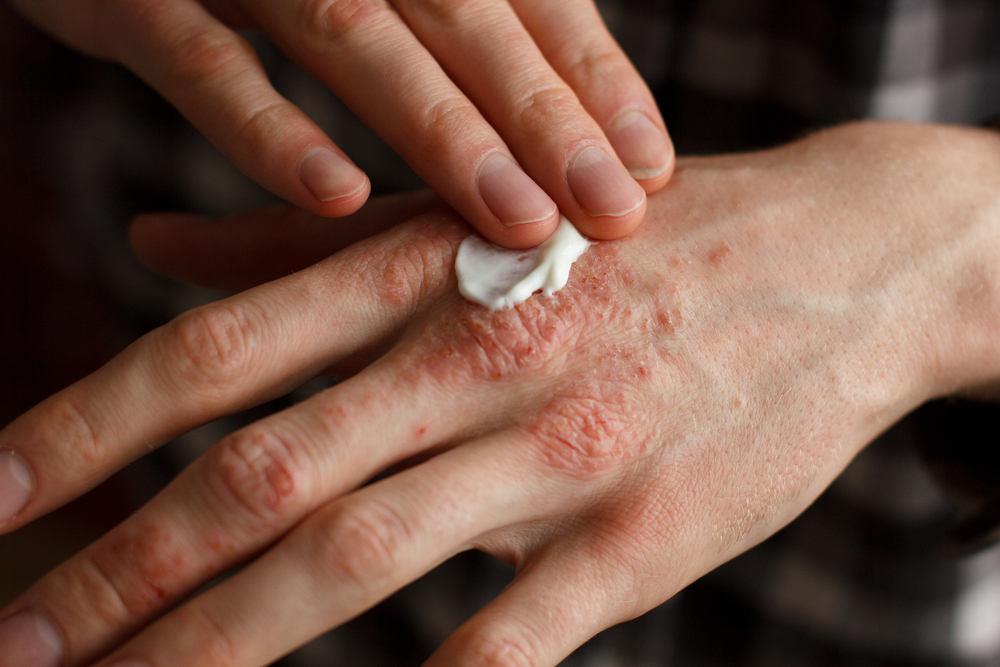Eczema is a frustrating, itchy, and sometimes painful skin condition that affects an estimated 31.6 million people in the United States alone, according to the National Eczema Association. It can show up in many ways, from hand eczema to cradle cap to bumps on your arms and legs. But no matter what type you're dealing with, understanding how to prevent and calm flare-ups is key to finding relief. Keep reading to learn how to develop an eczema skin care routine that will restore your skin barrier and reveal healthy, comfortable skin.
Dermatitis 101
"Dermatitis" is a catchall term for any type of skin inflammation, from psoriasis to a bug bite to an irritated pimple. Eczema also falls under this umbrella as atopic dermatitis (AD), the most common type of eczema. These terms are often used interchangeably.
What Does Eczema Look Like?
Eczema is the generic term for a chronic inflammatory condition that may cause itchy, rough, red, or inflamed skin. It often manifests as patches or rashes that can weep, bleed, crack, or swell when scratched. A compromised skin barrier or contact with irritants can exacerbate these symptoms. Luckily, eczema isn't contagious, though it often runs in families and is associated with asthma and seasonal allergies.
Children often develop AD on their cheeks and between skin folds, like behind the knees. Adults may develop AD first on their eyelids and hands. Over time, affected skin can become thick and scaly—a term called lichenification—from constant rubbing and scratching.
Understanding the Causes of Eczema: "The Itch That Rashes"
Dermatologists and researchers have yet to determine what causes eczema. The available research shows that people with AD, often referred to as "the itch that rashes," tend to have an overreactive immune system. This overactivity causes inflammation, which damages your protective skin barrier and leaves the skin vulnerable to irritants.
Who's at Risk?
The primary risk factors for AD include a family history of eczema and a personal history of asthma or seasonal allergies. AD is common in children but can occur at any age. According to the National Eczema Association, approximately 9.6 million American children have AD, and Black and Latinx children have higher incidences. Rates of childhood AD are similar among the sexes, but it's more likely to persist into adulthood in women.
What to Do When Eczema Flares Up
Exposure to pet and food allergens and irritants like dry skin, heat, sweat, rough fabrics, and harsh soaps can trigger flare-ups. When it comes to eczema skin care, there are two basic rules: keep moisture in and keep irritants out. You can accomplish these goals and help prevent flare-ups by establishing a routine with a few key components.
Bathe Thoughtfully
Bathe once a day for less than 10 minutes using warm water—not hot or cold. Extreme temperatures can strip your skin barrier and trigger flare-ups. Use a gentle, fragrance-free, non-soap cleanser and limit use to body parts prone to odor, like your underarms, genitalia, and feet. Skip abrasive bathing tools like loofahs or brushes—your hands will do the trick! After bathing, gently pat yourself dry with a clean towel. Apply any topical medications followed by a moisturizer while your skin is still damp. Follow these steps after washing your hands throughout the day to help protect the skin on your hands and wrists, too.
Pamper Your Skin Barrier
Moisturizing is a pivotal step in eczema skin care. Look for thicker creams and ointments with ingredients like Colloidal Oatmeal, ceramides, and Hyaluronic Acid to pull water back into the skin and calm irritation. Try a formula like EltaMD Skin Restore Body Cream, which includes Niacinamide, ceramides, and Hyaluronic Acid to strengthen and maintain the protective skin barrier. Aim to moisturize at least twice a day.
Avoid anything with fragrance, including candles, air fresheners, oil diffusers, and scented lotions. These ingredients are unnecessary and could further irritate your skin. The skin on your face and eyelids is especially delicate, so say no to spray fragrances, which can easily irritate these areas.
Ditch Irritating Chemicals
Remember to take a look at your detergents, too. Use detergents that are free and clear of all fragrances, dyes, and extra chemicals. Inspect the product label to see whether it's safe for sensitive skin or—even better—has the National Eczema Association Seal of Acceptance. As tempting as they are, avoid fabric softeners like dryer sheets or scent boosters. Added fragrances can weaken the skin barrier and trigger an AD flare-up.
Slather on the Sunscreen
Everyone should wear sunscreen during daylight hours to protect their skin from the sun's harmful ultraviolet (UV) rays. But sun protection is especially important for eczema skin care. Unprotected or prolonged sun exposure compromises your skin barrier, leaving you vulnerable to irritation. Choose a gentle mineral broad-spectrum SPF like EltaMD UV Pure Broad-Spectrum SPF 47. This sunscreen is formulated with mineral blockers Zinc Oxide and Titanium Dioxide to be gentle on sensitive skin and is free of fragrance, parabens, oils, dyes, and gluten.
Support Childhood Eczema
If you have a child with AD, remember to keep their nails short to help prevent trauma or infection from scratching. Also, keep indoor spaces at a comfortable temperature to avoid excessive heat or cold, which can trigger AD flare-ups. Monitor which clothing fabrics and moisturizers keep their skin the happiest—cotton clothing without tags is usually a good bet.
Seeking Support from a Dermatologist
If you suspect you might have AD, schedule an appointment with a board-certified Dermatologist. They can help explain the condition, talk through a treatment plan, and determine the optimal skin care regimen for you. Treatments for AD may include topical medications (like anti-inflammatory creams or ointments), oral steroids, and biologics (injectable medicines that target specific molecules in your body that cause inflammation). For large areas, your Derm may use controlled bursts of therapeutic UV light.
Along with prescription medications, following a consistent daily eczema skin care routine including moisturizer, sunscreen, and gentle bathing can help you down the path to calm, clear skin.

